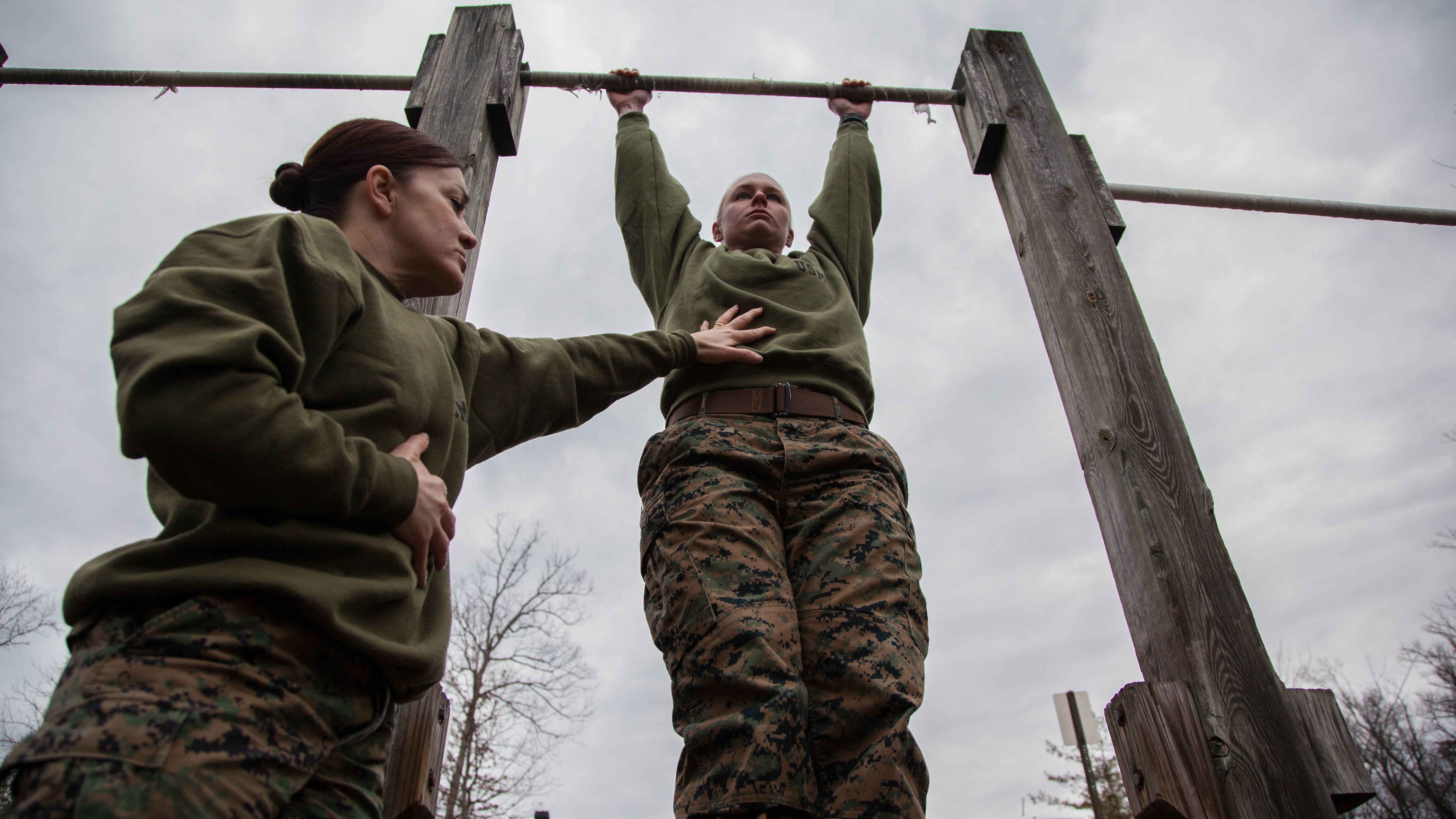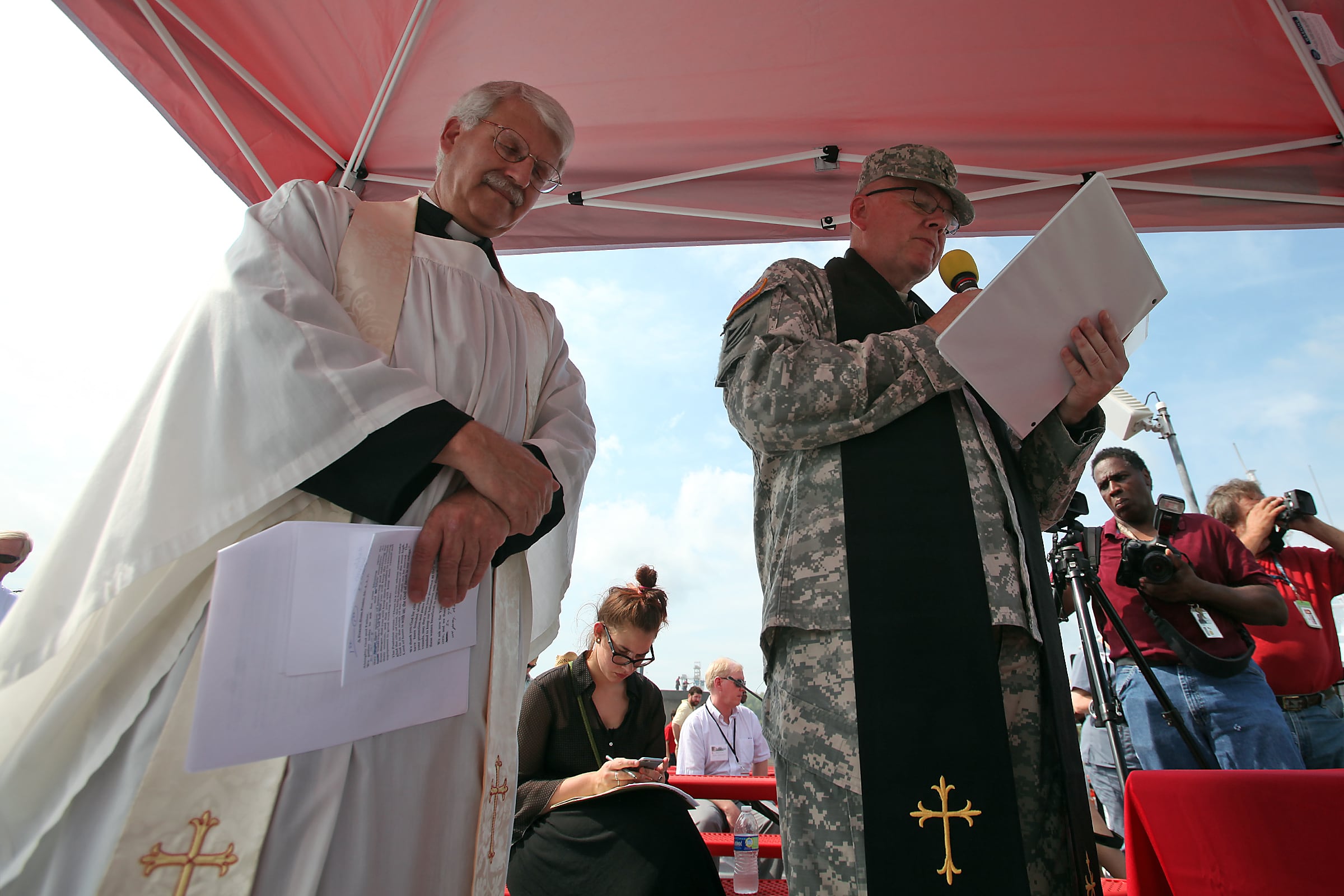Marine leaders have proposed a new physical fitness test that would still allow women to do the all but end the flexed-arm hang — but they're not likely to earn a first-class score without pullups. and require most women do between eight and 10 pullups to net a max score of 100 points.
A new plan for the PFT would require most women to do between eight and 10 pullups to net a max score on that portion of the test.
The potential change is in response to a fitness review ordered by Commandant Gen. Robert Neller. Marine leaders found that "some current [fitness] standards are either not relevant, not challenging or not attainable," according to a briefing obtained by Marine Corps Times. The plan was presented to Marine leaders last week. That doesn’t apply to female events alone. Male Marines between 21 and 35 would have to belt out 23 pull-ups for a max score under the new rules. The max drops by one for every five years of age after that, but never drops below 20 for men.
Women would still be allowed to do the flexed-arm hang under a new proposal, but would be given little incentive to do so. Points for the flexed-arm hang FAH would max out at 50, while one pullup would be worth 51 points.
Max pullups would vary by age, as is the case with all PFT events. The following would be required to obtain a maximum score:
- Ages 17 to 20: 7 pullups
- Ages 21 to 25: 8 pullups
- Ages 26 to 30: 10 pullups
- Ages 31 to 35: 10 pullups
- Ages 36 to 40: 8 pullups
- Ages 41 to 45: 7 pullups
- Ages 46 to 50: 6 pullups
- Ages 51+: 4 pullups
The plan would officially reverse a requirement announced by then-Commandant Gen. James Amos in late 2012 that women would soon be required to do at least three pullups to pass the PFT. Eight would needed for a max score, while men have to belt out 20. This was to end the era of the flexed-arm hang.
The plan never made it off the ground, though. Data collected in 2013 found that 55 percent of female recruits couldn't meet the minimum requirement. A study of 318 female Marines found that the women could complete 1.63 pullups on average. Roughly 20 percent of those Marines could only hit three pullups if they used their lower bodies in a "kipping" motion.
At that point, the Marine Corps allowed women to choose between pullups and the flexed-arm hang as officials developed a new plan. The transition was further extended when leadership decided to hold off on any decision until the three-year Women in Service Review wrapped up in 2015. In November, Neller directed top leaders to conduct a full review of the service's fitness and body composition standards, which led to this latest proposal.
Some say the proposed test would allow women the option to forgo the exercise if they still haven't quite mastered pullups.
"I don't like it, I love it!" Col. Robin Gallant, II Marine Expeditionary Force’s comptroller, said of the proposal. "I think this is a great way to implement the change as it gives an incentive to increase a score without the fear of failing the PFT," Col. Robin Gallant, II Marine Expeditionary Force’s comptroller, said of the proposal. "As women work on them to increase their score, they can be confident that they won't fail a PFT. I think this is a huge benefit and I'm glad it might become a reality."
An officer familiar with the proposal who spoke on the condition of anonymity said the Corps is moving in the right direction. Pullups are an "equitable metric more related to combat skills such as casualty [evacuation]evac," and would "be a step toward removing reducing and eliminating the perceived double-standard that exists."
"Since the PFT score is tied directly to promotion, there is already a sentiment that the scoring system is not fair," the officer said. "As women move into combat arms, this already existing problem could be exasperated. This kind of change will help us address conscious and unconscious bias about gender."
The officer added that who was not authorized to speak on the proposal and therefore spoke on condition of anonymity, said women could one day have the same pullup scoring scale as men, as is the case with crunches. But to do so now would set up many Marines for failure, and negatively impact career progression.
"This is the right approach," the officer said. "This will incentivize change without damaging a cohort that has trained their bodies to do specific exercises for many years, in some cases decades."

Marine poolees hoping to join the infantry have to complete at least three pullups before shipping off to boot camp.
Photo Credit: Sgt. Dylan Bowyer/Marine Corps
Gallant offered encouragement for women who have never trained their body to do a pullup. She pointed to "zero to 20-plus," a pullup program created by Maj. Misty Posey that was posted on the Marine Corps' official website in February. The 55-year-old colonel went from zero to 17 pullups in less than one year, and is still going strong.
"It is very doable for women to do pullups," Gallant said. "Most women can get their first pullup after about two weeks of being on the program. I worked on them for about half an hour in the morning and about 10 to 15 minutes in the evening. Once I got my first one, they came pretty quick after that. Once they get up to 10, it's a piece of cake to maintain it."
The colonel is confident "women will surprise everyone" if the proposals are adopted.
Senior leadership addressed the recommendations at an executive off-site meeting held last week at Joint Base Anacostia–Bolling in Washington, D.C. The recommendations were presented by Lt. Gen. Robert Walsh, the commanding general of Marine Corps Combat Development Command and deputy commandant of Combat Development and Integration.
The off-site brief was just one step in a months-long review of the Marine Corps' fitness standards, said Maj. Anton Semelroth, a MCCDC spokesman. The review is being led by Training and Education Command officials. Final recommendations are due to the commandant by July 1.
Lance M. Bacon is senior reporter for Marine Corps Times. He covers Marine Corps Combat Development Command, Marine Corps Forces Command, personnel / career issues, Marine Corps Logistics Command, II MEF, and Marine Forces North. He can be reached at lbacon@marinecorpstimes.com.





